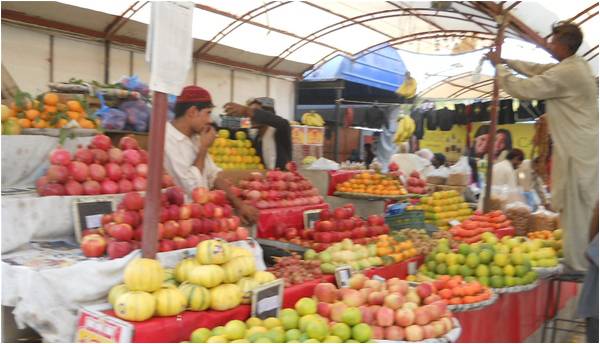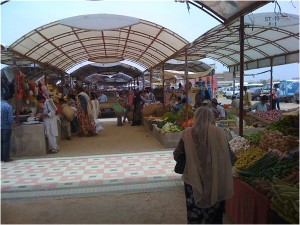
The wee hours of April 6, 2015 saw the end of a Karachi phenomenon as DHA Authorities dismantled Sunday Bazaar and razed it to the ground. Sources in the Clifton Cantonment Board say the lease ended on Dec 31, 2014 but DHA Authorities granted the market organizers a grace period of 3 months. After the extension ended on March 30, 2015, “Itwaar Bazaar” remained open for business one last Sunday on April 5, 2015.
Spread over a vast tract of 17 acres, Sunday Bazaar was not just a flea market; it was a fruit and vegetable bazaar for some, a place to picnic for others and a treasure trove for many. This large open-air weekly market was a colorful bonanza of antiques, banned books, collectors’ items, vintage camera & accessories, refurbished household electronics and kitchen appliances, rumored NATO supply security gear and weapon accessories, repaired Samsonite and Delsey suitcases, bone china crockery, gold-edged English tea sets, fine cutlery sets, imported Crystal glasses, used and unused clothes from thrift stores abroad, racy lingerie, discarded American sneakers, authentic Persian rugs, any and all home goods, making it a shopping haven for not only low income families but anyone who loved a good bargain.
Around 2,200 shops offered an almost unmatchable range of goods to people from all walks of life and all cross-sections of the society. “6,000-7,000 bikes and 4,000-5,000 cars were parked there every Sunday. Land Cruisers to Suzukis and Rickshawks, Bikes and Cabs, we saw all sorts of traffic,” says Amanullah, the Ex-Parking Contractor of Sunday Bazaar.
The bazaar was set up in Phase VIII 16/17 years ago and given its tremendous success over time, about seven years ago DHA constructed solid pavements to facilitate shoppers. With time and growing popularity, an entire infrastructure developed around it. Young Afghan boys, aged 12 and above, served as helpers, lugging around good-laden baskets that weighed nothing less than 20 kg each and often they were seen carrying more than one.

“The people arriving in cars were mostly interested in fruits and vegetables and thrift store clothing, shoes and handbags from brand names they recognized. Many of them also bought crockery and books,” says Haji Farook, ex-Market Contractor, Sunday Bazaar “But it was the low income families that bought everything from new shalwar kameez at a bargain rate of Rs.200 a shirt, discarded foreign shoes, plastic hair clips, repaired kitchen appliances, local crockery, budgeted carpets, towels and other miscellaneous personal and household items.”
Searching through vast tracts of flora and fauna that washed up along this market on the Arabian Sea shore were seen known TV faces, celebrities from the fashion world, bored housewives, curious out-of-towners, collectors of books, teapots, crockery and other paraphernalia sporting their Sunday hats; many of them Itwaar Bazaar regulars. Moiz Kazmi of MR Digital Event Management says, “I was there every alternate Sunday if not every week. Not only did it provide an opportunity for cheap retail therapy, the place was bustling with great finds.”
Ace photographer and culture enthusiast, Tapu Javeri was also “there almost once a month, if not more. Apart from being a great place to visit on a lazy Sunday, it was also very inspirational; one could find amazing curios and props for shoots.”
It was a place where satisfaction was guaranteed – there was something in store for everybody. Almost everyone who visited came away with a sense of victory. “I bought some great vintage belts for a bargain rate of Rs.200 a piece, crystal décor items for as low as Rs.600 and original Diesel and other branded jeans for Rs.500 a pair,” relates Kazmi. “But my best purchase so far has been a pocket sized hair straightener that I bought for a mere Rs.150. It still works!”

 It seems the list of amazing finds was just never-ending. Javeri says, “I’ve bought some real masterpiece vintage cameras, some antique photographs, loads of great books, even crappy trinkets from there. The whole charm was that you really had to search out the gems from the junk.”
It seems the list of amazing finds was just never-ending. Javeri says, “I’ve bought some real masterpiece vintage cameras, some antique photographs, loads of great books, even crappy trinkets from there. The whole charm was that you really had to search out the gems from the junk.”
Zara G., a 26 year old young urban professional who recently moved back to Karachi from the States, says “I used to love going to Sunday Bazaar. I would take anyone visiting Karachi mainly because I wanted to go. One never knew what one would find on any given Sunday. One of the best things I’ve stumbled upon has been a Rs.150 TV remote to replace our broken one. Eight months on and it’s still going strong. It’s a blessing to not have to flip channels only using the down button!”
Surprisingly, the book trade was huge at Sunday Bazaar. Zara says, “The book swap was the best! You could give them a book along with some money and change it for any other book you picked up there.” Kazmi says, “Just when you thought it couldn’t get any better, there was the books section. Apart from the best sellers, magazines and look books, I hit across a couple of banned books, namely Rushdie’s ‘Satanic Verses’ and Wolpert’s ‘Jinnah of Pakistan.’ ”
It is little wonder then that Karachiites are in mourning. Many city residents would just go for the buzz. “I would sometimes go straight after a long Saturday night, really early in the morning, eat my breakfast there, talk to shopkeepers, spend time, feast on lamb chops and Afghan pulao and look at the goods on display to take the edge off my hectic week,” says another Sunday Bazaar buff, “I am going to miss it all - the people, the stalls, the charged atmosphere.”
Kazmi adds, “I knew my way through the maze pretty well and had learnt the shop numbers of my favorite stalls. I guess I will have to re-learn new shop numbers if and when the Sunday Bazaar comes back!”
Saba, the wife of a diplomat says, “Friends and family who were visiting the city would insist on going there. Most of them planned their Karachi trips keeping a ‘Sunday’ in mind. Hope it comes back soon and someplace as breezy and safe as this last one was.”
Sunday Market traders suffered a great setback with the demolition of the bazaar. “The weekly carnival provided income support to nearly 10,000 households as each of the 2,000 plus stalls had five to six members working there. Some of them had no other employment and depended upon Itwaar Bazaar for their livelihood,” says Amanullah.
“We were sending out alerts of a complete shut down all across the bazaar through microphones, urging the shopkeepers to pack all their goods at the end of each session. But still it came as a complete shock to see the bulldozers, when they finally arrived,” laments Haji Farook.
DHA Authorities maintain that the owners of the property, on which the bazaar was set up, wanted possession of their land so no further extension was possible. However, the significance this weekly extravaganza had gained has left everyone wondering if there will be another Sunday Bazaar. “There are rumors adrift of a replacement bazaar near ‘2 Darya’ although no high ranking official has confirmed it yet. Let’s see what happens,” says a hopeful Amanullah. Until then, to wait and watch is the only possibility.
Sunday Bazaar was not just a flea market; it was a fruit and vegetable bazaar for some
Spread over a vast tract of 17 acres, Sunday Bazaar was not just a flea market; it was a fruit and vegetable bazaar for some, a place to picnic for others and a treasure trove for many. This large open-air weekly market was a colorful bonanza of antiques, banned books, collectors’ items, vintage camera & accessories, refurbished household electronics and kitchen appliances, rumored NATO supply security gear and weapon accessories, repaired Samsonite and Delsey suitcases, bone china crockery, gold-edged English tea sets, fine cutlery sets, imported Crystal glasses, used and unused clothes from thrift stores abroad, racy lingerie, discarded American sneakers, authentic Persian rugs, any and all home goods, making it a shopping haven for not only low income families but anyone who loved a good bargain.
Around 2,200 shops offered an almost unmatchable range of goods to people from all walks of life and all cross-sections of the society. “6,000-7,000 bikes and 4,000-5,000 cars were parked there every Sunday. Land Cruisers to Suzukis and Rickshawks, Bikes and Cabs, we saw all sorts of traffic,” says Amanullah, the Ex-Parking Contractor of Sunday Bazaar.
The bazaar was set up in Phase VIII 16/17 years ago and given its tremendous success over time, about seven years ago DHA constructed solid pavements to facilitate shoppers. With time and growing popularity, an entire infrastructure developed around it. Young Afghan boys, aged 12 and above, served as helpers, lugging around good-laden baskets that weighed nothing less than 20 kg each and often they were seen carrying more than one.

“The people arriving in cars were mostly interested in fruits and vegetables and thrift store clothing, shoes and handbags from brand names they recognized. Many of them also bought crockery and books,” says Haji Farook, ex-Market Contractor, Sunday Bazaar “But it was the low income families that bought everything from new shalwar kameez at a bargain rate of Rs.200 a shirt, discarded foreign shoes, plastic hair clips, repaired kitchen appliances, local crockery, budgeted carpets, towels and other miscellaneous personal and household items.”
Searching through vast tracts of flora and fauna that washed up along this market on the Arabian Sea shore were seen known TV faces, celebrities from the fashion world, bored housewives, curious out-of-towners, collectors of books, teapots, crockery and other paraphernalia sporting their Sunday hats; many of them Itwaar Bazaar regulars. Moiz Kazmi of MR Digital Event Management says, “I was there every alternate Sunday if not every week. Not only did it provide an opportunity for cheap retail therapy, the place was bustling with great finds.”
Ace photographer and culture enthusiast, Tapu Javeri was also “there almost once a month, if not more. Apart from being a great place to visit on a lazy Sunday, it was also very inspirational; one could find amazing curios and props for shoots.”
It was a place where satisfaction was guaranteed
It was a place where satisfaction was guaranteed – there was something in store for everybody. Almost everyone who visited came away with a sense of victory. “I bought some great vintage belts for a bargain rate of Rs.200 a piece, crystal décor items for as low as Rs.600 and original Diesel and other branded jeans for Rs.500 a pair,” relates Kazmi. “But my best purchase so far has been a pocket sized hair straightener that I bought for a mere Rs.150. It still works!”

 It seems the list of amazing finds was just never-ending. Javeri says, “I’ve bought some real masterpiece vintage cameras, some antique photographs, loads of great books, even crappy trinkets from there. The whole charm was that you really had to search out the gems from the junk.”
It seems the list of amazing finds was just never-ending. Javeri says, “I’ve bought some real masterpiece vintage cameras, some antique photographs, loads of great books, even crappy trinkets from there. The whole charm was that you really had to search out the gems from the junk.”Zara G., a 26 year old young urban professional who recently moved back to Karachi from the States, says “I used to love going to Sunday Bazaar. I would take anyone visiting Karachi mainly because I wanted to go. One never knew what one would find on any given Sunday. One of the best things I’ve stumbled upon has been a Rs.150 TV remote to replace our broken one. Eight months on and it’s still going strong. It’s a blessing to not have to flip channels only using the down button!”
Surprisingly, the book trade was huge at Sunday Bazaar. Zara says, “The book swap was the best! You could give them a book along with some money and change it for any other book you picked up there.” Kazmi says, “Just when you thought it couldn’t get any better, there was the books section. Apart from the best sellers, magazines and look books, I hit across a couple of banned books, namely Rushdie’s ‘Satanic Verses’ and Wolpert’s ‘Jinnah of Pakistan.’ ”
It is little wonder then that Karachiites are in mourning. Many city residents would just go for the buzz. “I would sometimes go straight after a long Saturday night, really early in the morning, eat my breakfast there, talk to shopkeepers, spend time, feast on lamb chops and Afghan pulao and look at the goods on display to take the edge off my hectic week,” says another Sunday Bazaar buff, “I am going to miss it all - the people, the stalls, the charged atmosphere.”
Kazmi adds, “I knew my way through the maze pretty well and had learnt the shop numbers of my favorite stalls. I guess I will have to re-learn new shop numbers if and when the Sunday Bazaar comes back!”
Saba, the wife of a diplomat says, “Friends and family who were visiting the city would insist on going there. Most of them planned their Karachi trips keeping a ‘Sunday’ in mind. Hope it comes back soon and someplace as breezy and safe as this last one was.”
Sunday Market traders suffered a great setback with the demolition of the bazaar. “The weekly carnival provided income support to nearly 10,000 households as each of the 2,000 plus stalls had five to six members working there. Some of them had no other employment and depended upon Itwaar Bazaar for their livelihood,” says Amanullah.
“We were sending out alerts of a complete shut down all across the bazaar through microphones, urging the shopkeepers to pack all their goods at the end of each session. But still it came as a complete shock to see the bulldozers, when they finally arrived,” laments Haji Farook.
DHA Authorities maintain that the owners of the property, on which the bazaar was set up, wanted possession of their land so no further extension was possible. However, the significance this weekly extravaganza had gained has left everyone wondering if there will be another Sunday Bazaar. “There are rumors adrift of a replacement bazaar near ‘2 Darya’ although no high ranking official has confirmed it yet. Let’s see what happens,” says a hopeful Amanullah. Until then, to wait and watch is the only possibility.

